Rapid response grants empower civil society to support Ukrainians, address domestic implications of Russia-Ukraine war
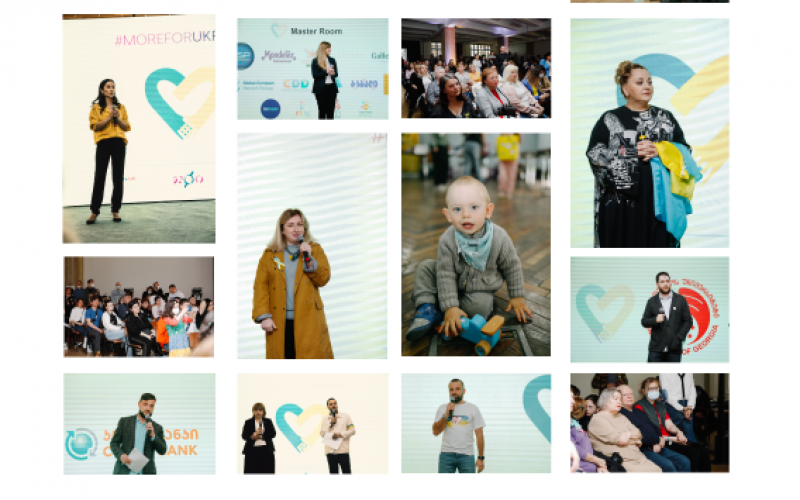
Since the conflict began in late February, Russia’s war of aggression against Ukraine has had a devastating humanitarian impact, security implications, and economic consequences that have reverberated throughout the region and the world.
With its geographical proximity to the conflict, Euro-Atlantic aspirations, and own complicated relations with Russia, Georgia found itself in a particularly susceptible position at the onset of the war. Despite an outpouring of public and private assistance for Ukrainians coming to Georgia and widespread support from the Georgian population, nationwide debates around Georgia’s role in the war emerged – with questions centered on Georgia’s relationship with Russia, the possibility of conflict erupting in Georgia, and the war’s impact on the country’s EU integration aspirations.
Recognizing the swiftly evolving nature of this acute crisis that required coordinated efforts, the USAID Civil Society Engagement Program launched an application call for its Rapid Response Grant Program in the first week of March 2022.
The grant program, which was designed to support community organizing and activism by Georgian civil society organizations (CSOs), civic movements, and citizen groups in response to the Ukraine war, offered a simplified grant procedure that allowed grantees the ability to rapidly deploy flexible resources in a timely manner and address some of the most urgent emerging needs.
The program awarded 6 Rapid Response Grants, of which:
• 3 grants provided rapid assistance to Ukrainians coming to Georgia
• 3 grants addressed the war’s impact on Georgia through varied perspectives and approaches
The grantees were represented by a wide range of organization types and geographic locations, including well-established CSOs in Tbilisi, a regional community organization based in the Adjara region, a think tank, a newly formed citizen group, and a media organization. By allowing these diverse actors to identify and address issues related to the war in Ukraine and its impact through varied approaches, including crowdfunding, community organization, policy research, awareness-raising, and collection of war crimes evidence, the Rapid Response Grant Program was able to harness their expertise and create a more unified and effective response.
Four out of six grantees completed their activities by the end of June 2022. Check out the six projects and their accomplishments below.
1. Orbeliani Georgia’s #MoreForUkraine event
One of the first organizations to identify a need for coordination in the weeks following Russia’s invasion of Ukraine was NGO Orbeliani Georgia, which hosted the #MoreForUkraine event in Tbilisi on April 2 to respond to the initial needs of Ukrainians coming to Georgia.
The event, which was attended by more than 400 Ukrainians, brought together an expo of more than 50 NGOs, universities, companies, and legal consultants that were on hand to answer questions and provide information on available support, while performances by Georgian singer Nino Katamadze and famous conductor Nikoloz Rachveli provided an atmosphere of unwavering solidarity.
The event also served as a kick-off for the launch of a crowdfunding campaign on the organization’s crowdfunding platform Orbeliani Meti. The funds raised, which totaled more than 21,000 GEL, were used in various ways, including the procurement of children’s clothes as well as skills trainings and community events for Ukrainians living in Georgia.
2. Dopomoga Ukraini – inclusive web platform helps Ukrainians access assistance
Recognizing that a lack of coordination combined with a significant language barrier had left many Ukrainians in Georgia struggling to access information about the help available to them, citizen group Dopomoga Ukraini formed to create a one-stop bilingual website where Ukrainians coming to Georgia could access verified information on a number of topics, including medical services, legal assistance, accommodation, education, psychological services, and employment opportunities.
As previously reported, in addition to more the than 400 posts offering assistance and information on the website dopomoga.ge, the team was also able to leverage social media to extend their reach and create a forum for Ukrainians in Georgia to communicate their real time needs. With a Facebook group boasting membership of more than 5,900 and more than 4,600 followers on its Facebook page, Dopomoga has become the go-to group for both Ukrainians seeking assistance and Georgians looking to lend a hand. The group has also offered individualized assistance to nearly 250 Ukrainians since its inception and created Ukrainian language guidebooks with answers to some of the most frequently asked questions for migrants, including information on schooling, real estate, and business registration.
3. Empathy – gathering evidence of Russian war crimes
In addition to helping Ukrainians access assistance following their migration to Georgia, Dopomoga Ukraini has also worked to connect them with the resources they need to deal with trauma faced during the war. As part of that effort, Georgian non-profit organization Empathy launched its project to help gather evidence of Russian war crimes inflicted on Ukrainians.
Empathy, which has more than 20 years of experience working with war-affected populations in Georgia and training in international best practices, has thus far collected, analyzed, and documented potential war crimes for 18 Ukrainians living in Georgia, which are being submitted to both the Ukrainian Prosecutor’s Office and the International Criminal Court. In addition to this, Empathy is also offering free psychological services and legal assistance for Ukrainians impacted by the war. Following psychological evaluations, the organization continues to deliver long term interventions for 10 Ukrainians and hosts regular art therapy sessions.
4. World Experience for Georgia – examining Georgia’s energy dependence on Russia
One of the prevailing public debates in the wake of Russia’s invasion of Ukraine centered on Georgia’s energy dependence and security, which some feared could come under threat if the country expressed solidarity with Ukraine or levied sanctions against Russia for its aggression.
In response to this public concern, think tank World Experience for Georgia (WEG) launched a research project aiming to address some of the most pressing questions regarding Georgia’s short term energy security, including Georgia’s energy dependence on Russian imports, Russian capital in the Georgian energy market, and the impact of the EU’s energy policy towards Russia on Georgia.
In the report’s findings, which were published in both English and Georgian, WEG found that Georgia’s dependence on Russian energy does not present a short-term critical security issue. It also concluded that despite a significant presence of Russian capital in Georgia’s energy market, the country has legal safeguards in place to take control of energy companies if their actions constitute a threat to national security. Further to publication on WEG’s website and Facebook page, the report has also been covered in more than 15 articles and videos produced by 10 media outlets, including national broadcasters Formula, Pirveli, Mtavari, and fellow rapid response grantee, Indigo.
5. Indigo – multimedia project addresses pressing questions about war’s impact on Georgia
In addition to questions about energy security, the news of war in Ukraine left many in Georgia with a sense of unease about the war’s impact on their country. With partisan debates playing out in the polarized mainstream media, independent media organization Indigo launched a multimedia project that approached some of the most sensitive topics weighing on the minds of Georgians.
The project produced 15 multimedia products, which covered topics like Georgian attitudes towards war-related migration, the country’s economic dependence on Russia, and the conflict’s possible impact on Georgia’s EU integration aspirations. Notably, these videos, articles, and photo spreads focused their attention on coverage of diverse perspectives often excluded from the mainstream media. For instance, when covering the issue of Georgian perceptions of war-related migration, Indigo incorporated several interviews discussing the experience of Russian migrants who had fled their country, a viewpoint often unrepresented in the migration debate.
In addition to publication on its website, Indigo also promoted its multimedia campaign on its Facebook page and Instagram account, with the campaign’s total Facebook reach amounting to nearly 300,000; total video views at 94,000; and article views at 33,000.
6. Solidarity – countering Russian disinformation narratives in remote areas of Adjara
Along with its physical attack on Ukraine, Russia has also intensified its information war in recent months – with Georgia serving as one of its prime targets. In parallel with the war, Georgian far right and pro-Russian groups also intensified their operations in Georgia’s regions, where the population often has less access to varied information sources and is particularly susceptible to Russian disinformation.
In the remote mountainous area of Georgia’s Adjara region, far right political groups used their established propaganda machine at the onset of the war to circulate the idea that Georgia should declare neutrality, arguing that Georgia’s Euro-Atlantic aspirations were setting it on a path similar to Ukraine’s with an imminent threat of Russian invasion.
In response to this and other concerning pro-Russian narratives, community organization Solidarity Community launched an outreach campaign in April to counter disinformation narratives about the war. The campaign, which focused its efforts on four municipalities (Khelvachauri, Keda, Shuakhevi and Khulo), organized 8 face-to-face meetings with local teachers and members of the community to engage in discussions about Russian disinformation and the topic of neutrality. In addition to reaching more than 225 people through in-person meetings, the group also disseminated 500 information booklets in the community and used short videos to promote both its meetings and message on its Facebook page.



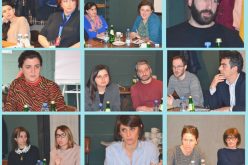
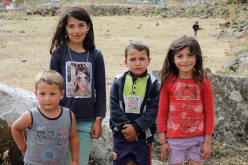
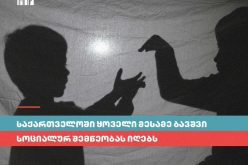
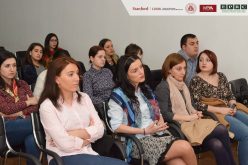
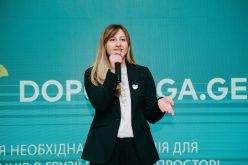
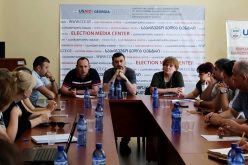
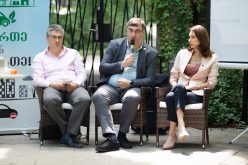




Leave a Reply